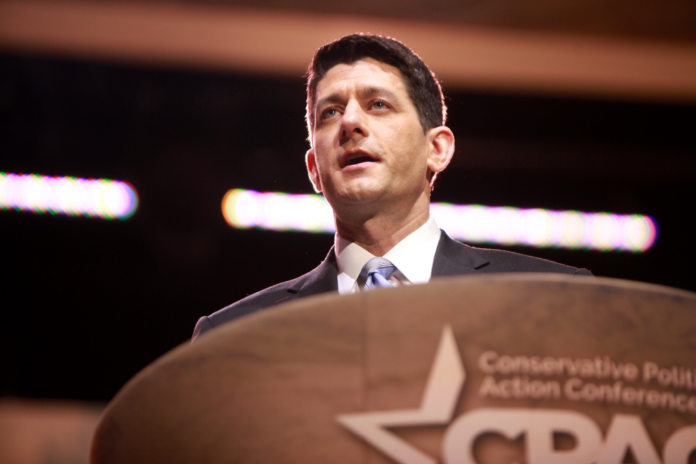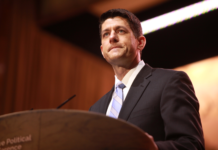
(American Greatness) — Of all the reactions to Paul Ryan’s speech Thursday at the Reagan Library in California, I thought the funniest was the one titled “Paul Ryan Begins to Re-emerge.” I found that idea funny because the speech I heard signaled the opposite: not burgeoning “re-emergence” on to the political stage but, on the contrary, an almost comical confirmation of obscurity.
Ryan is a careful man, well-pressed, armed with all the best clichés, and utterly feckless. He salted his talk with plenty of gems calculated to appeal to conservatives. He appealed early and often to the ghost of Ronald Reagan — understandable given the auspices of his talk. And his speechwriters dropped all the right phrases about keeping government off the people’s backs, the evils of identity politics and political correctness, the desirability of low taxes, and economic prosperity.
He was also careful to rehearse some of the achievements of the last four years, the years when his nemesis Donald Trump ran the roost. He was happy to associate himself with those triumphs.
Nevertheless, sounding like an obbligato throughout Ryan’s talk was a warning that Republicans must not tether their fortunes to the wagon of Trumpism. He had a few nice words for populism, but then warned:
“If the conservative cause depends on the populist appeal of one personality or of second-rate imitations, then we’re not going anywhere. Voters looking for Republican leaders want to see independence and mettle. They will not be impressed by the sight of yes-men and flatterers flocking to Mar-a-Lago. We win majorities by directing our loyalty and respect to voters and by staying faithful to the conservative principles that unite us.”
A skeptical observer might wonder what Paul Ryan knows about how to “win majorities.” A skeptical observer who was also uncharitable might utter the name “Mitt Romney” at this point. I would not stoop so low.
I think there are two takeaways from the former Republican House speaker’s emetic performance on Thursday. One concerns the species of conservatism for which he is a —well, I was going to say “spokesman,” but that is not quite right since he speaks for no one, really, except for himself. Perhaps it would be more accurate to say “for which he is an embodiment.”
What is that brand of conservatism? It is more an attitude than a definable philosophy. It is understated, well-polished, and clubbable. It is comfortable uttering nostrums that sound conservative while actually achieving nothing. It is what we might call “window-dressing conservatism.” Safe. Pampered. Epicene. Above all, it is adept at losing while covering those losses with a glaze marked “dignity.” “We lost, my fellow Americans, but at least we did it with our heads held high.”
Ryan’s sort of “conservatism” — I know that the scare quotes seem snide — is impervious to the hard wisdom of Horace Walpole. “No country was ever saved by good men,” Walpole once observed, “because good men will not go to the length that may be necessary.” Does that mean that successful politicians are not good men? No — at least not necessarily. It does mean that they are about actions more than words.
And it means they care about winning. Winston Churchill allegedly allowed Coventry to remain unevacuated before it was bombed by the Nazis. He did this because he knew that evacuating the city would alert the Germans to the fact that their Enigma codes had been broken. Paul Ryan, I note, is hosting a fundraising event for — drum roll! — Liz Cheney.
Representative Liz Cheney, R-Wyo., actually represents Peggy Noonan and the republic of Georgetown. Spiritually, it’s the same constituency represented by Mitt Romney and his understudy, Paul Ryan.
But losing with dignity is only part of Paul Ryan’s appeal to the administrative state and the political dispensation that supports it. The second take-away from his speech revolved around his warning that conservatives ought to be wary of taking the disputes of “the culture wars” too seriously.
I raised an eyebrow at the term “culture wars,” too. Is that lingo from the 1960s? Yes, it is. But of course, we all know that what first flowered in the cultural revolution of those seemingly endless decades of the 1960s and 1970s has enjoyed a sudden rebirth in the age of “woke” identity politics.
Ryan half acknowledges this. “What we could once dismiss as pretentious academic theory, confined to overworked dissertations in obscure journals, somehow has become Democratic Party orthodoxy. Everything has to be about race, gender, and class. Every person is just a stand-in for one group interest or another. That’s identity politics, constantly accusing, suspecting, claiming victimhood, pulling us apart from one another. And lately, all of this has gone from ideology to obsession.”
True, all too true. But he follows that strophe with an antistrophe of repudiation. “But as the Left gets more woke,” he said, “the rest of America is getting weary.”
“This stuff is exhausting, and we conservatives have got to be careful not to get caught up in every little cultural battle. Sometimes, these skirmishes are just creations of outrage peddlers detached from reality and not worth anybody’s time. They draw attention away from the far more important case we must make to the American people. Culture matters, absolutely. Yes.”
Oh, yes, “absolutely.”
And here comes the squid ink and the capitulation:
“But our party must be defined by more than a tussle over the latest grievance or perceived slight. We must not let them take priority over solutions grounded in principle [in principle, you understand] to improve people’s lives, because politics based on racial or other identity is always a path to deeper and deeper hostility, with sad and harmful consequences, and it is precisely the opposite of conservative thought.”
Extra credit if you can parse this argument and outline the logic that gets us from culture mattering “absolutely” to letting the disgusting assaults of critical race theory (say) go because it really wouldn’t do to “get caught up in every little [it would be little] cultural battle.”
Paul Ryan just made a plea on behalf of “decent and elevated conservatism” (Trademark: Bill Kristol) as opposed to the icky, low-class conservatism of Donald Trump. But here’s the thing. Donald Trump actually did something about the “race-gender-class” bigots, just as he did something about illegal migration across our southern border, energy, unemployment, out-of-control regulation, a confiscatory and uncompetitive tax policy, mayhem in the Middle East, and the threat of a newly belligerent China.
The Democrats, of course, no less than the media, slobbered all over Ryan for his anti-Trump speech, but of course, that love is strictly conditioned on Ryan remaining a pajama-boy conservative. I’d say there was no danger of his being anything else, but you can be sure that he, too — just like Donald Trump, just like the Grecian Formula pol Mitt Romney — would be instantly decried as “literally” Hitler should it ever happen that he was seen as a threat to the established “progressive” compact that increasingly holds this country in the moist palm of its smug and self-satisfied tyranny.
Roger Kimball
Roger Kimball is editor and publisher of The New Criterion and the president and publisher of Encounter Books. He is the author and editor of many books, including The Fortunes of Permanence: Culture and Anarchy in an Age of Amnesia (St. Augustine's Press), The Rape of the Masters (Encounter), Lives of the Mind: The Use and Abuse of Intelligence from Hegel to Wodehouse (Ivan R. Dee), and Art's Prospect: The Challenge of Tradition in an Age of Celebrity (Ivan R. Dee).










